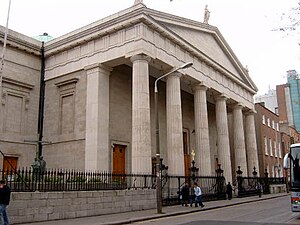St Mary's Pro-Cathedral
| St Mary's Pro-Cathedral | |
|---|---|

St Mary's Pro-Cathedral from Marlborough Street
|
|
| Location | Dublin |
| Country | Ireland |
| Denomination | Roman Catholic |
| Website | Website |
| History | |
| Consecrated | 1825 |
| Architecture | |
| Status | Active |
| Functional status | Cathedral |
| Style | Neoclassical |
| Administration | |
| Diocese | Dublin (since 1028) |
| Province | Dublin |
| Clergy | |
| Archbishop | Diarmuid Martin |
| Laity | |
| Organist(s) | Professor Gerard Gillen |
Coordinates: 53°21′3″N 6°15′33″W / 53.35083°N 6.25917°W
St Mary's Church (Irish: Leas-Ardeaglais Naomh Muire), known also as St Mary's Pro-Cathedral or simply the Pro-Cathedral, is a pro-cathedral and is the episcopal seat of the Roman Catholic Archbishop of Dublin and Primate of Ireland.
The city of Dublin possesses two cathedrals, but unusually, both belong to one church, the minority Church of Ireland, which up until 1871 had been the religion of establishment in Ireland. In contrast, the majority religion in Ireland, Roman Catholicism, has no cathedral in Ireland's capital city and has not had one since the Reformation, when the Church of Ireland was founded following Henry VIII's break from Rome. As the official church, the Church of Ireland took control of most church property, including the Cathedral of the Holy Trinity (generally known as Christchurch) and St. Patrick's Cathedral. These two churches had long shared the role of cathedral of Dublin, controversially at first, then under an agreement of 1300, Pacis Compositio, which gave Christchurch formal precedence, including the right to enthrone the Archbishop and to hold his cross, mitre and ring after death, but with deceased Archbishops of Dublin to be buried alternately in each of the two cathedrals, unless they personally willed otherwise, and the two cathedrals to act as one, and "shared equally in their freedoms".
...
Wikipedia
